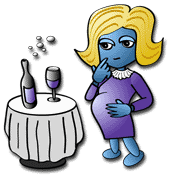Part 6: The Case for Drug Use
The previous 12 arguments cover most of the reasons given against letting people take drugs. Each of the 12 are grounded either in paternalism or a desire to prevent harm to others. Many of them rely upon a utilitarian calculation under which even if most people do not cause harm to others, those who do will cause sufficient harm to outweigh the benefits of letting everyone take drugs at will.
Now, we can make the case that liberty does justify our ability to take drugs. This case for drug use must do two things: First, it must rest in a coherent conception of liberty that will defend drug use as beyond the state's power to criminalize. Second, it must respond to all 12 of the above arguments. One of the best conceptions of liberty that one can employ to defend drug use is the harm principle. As such, a case can be made that on a harm principle account of liberty, rational adults are justified in using drugs. As we are familiar with the harm principle, we can move directly to offering a response to the 12 arguments against drug use.
We can chart these 12 arguments and the response as follows:
Analysis of Drug Prohibitions |
|||
Paternalism #1 - 3 |
Alcohol #4 - 7 |
Harm Reduction #8 - 10 |
Other #11-12 |
Use can kill |
Harm to fetus |
Crime |
Addiction |
Relies on paternalism; Legalization would lead to safer drugs; decrease overdoses |
Likely contradiction to argue these while accepting alcohol |
Legalization would lower crime and lower costs to that of coffee and tobacco. Needle exchange reduces disease. |
It is not clear that addiction or access by minors will rise significantly; Kids already have access. |
Paternalism #1-#3
The first three arguments against drug use depend upon paternalism. Though this may be acceptable in a theory of liberty like Aristotle's, Mill clearly rejects paternalism in favor of the harm principle. As a result, these arguments are irrelevant to anyone who accepts the harm principle. Furthermore, to the paternalist it could be argued that allowing people to take drugs will make drugs safer to take.
 Think about it this way: when you buy your crack from Charlie, the local crack house manager, what is Charlie's interest in making sure the product he sells you is safe? The answer is very little. If you become ill because Charlie's crack is made improperly (or because he cut it with baking powder or something worse), there isn't much you can do as Charlie is the only source in your area and you can't very well sue him. Yet, if you were free to buy your crack at Wal-Mart (or in bulk at Sam's Club), then you can be certain that it was produced with quality controls and is labeled for its potency and so forth. Wal-Mart would have a direct interest in ensuring it was the safest (as safe as crack can be) product on the market; otherwise, they could be liable.
Think about it this way: when you buy your crack from Charlie, the local crack house manager, what is Charlie's interest in making sure the product he sells you is safe? The answer is very little. If you become ill because Charlie's crack is made improperly (or because he cut it with baking powder or something worse), there isn't much you can do as Charlie is the only source in your area and you can't very well sue him. Yet, if you were free to buy your crack at Wal-Mart (or in bulk at Sam's Club), then you can be certain that it was produced with quality controls and is labeled for its potency and so forth. Wal-Mart would have a direct interest in ensuring it was the safest (as safe as crack can be) product on the market; otherwise, they could be liable.
Although this example is clearly extreme, there is historical evidence for the claim. During prohibition of alcohol, much of the product was produced by gangs such as Al Capone's. The quality was poor as little care was put into making it. When the ingredients were not all available, people would simply improvise (one might recall the Simpson's episode where Homer makes booze in his bathtub as a historically-based example of this time period). Many people died during Prohibition, not from drinking too much, but from drinking poor quality liquor that was made improperly or had impurities in it. Since Prohibition, alcohol is much safer as every bottle is labeled for alcohol content, and every manufacturer has a financial interest in product safety.
Alcohol #4-#7
Hey, who thinks that drinking is immoral?
(I've asked this in class and found very few hands go up).
Most students, and Americans in general, find nothing immoral about drinking. At one point Americans did think drinking was immoral; this view became so common that we amended the Constitution to prohibit alcohol by law. Though we are not going to debate the morality of drinking, it is of great importance to note how most of us do not think alcohol is immoral. The acceptance of alcohol does present a major problem for those arguing against drugs. Drug use is often criticized on the grounds that it causes: Harm to fetuses, increased accidents, increased  violence and abuse, and a loss of economic productivity (arguments 4-7).
violence and abuse, and a loss of economic productivity (arguments 4-7).
However, there is a serious conflict between the acceptance of alcohol and the use of these arguments against drugs. Concerning harm to fetuses, three words come to mind: fetal alcohol syndrome . According to the National Organization of Fetal Alcohol Syndrome, "FAS is the leading known cause of mental retardation and birth defects." It seems that alcohol causes tremendous harm to more fetuses than drugs do, yet we do not seem persuaded that this is a good reason to oppose drinking. So it seems hypocritical to apply the reasoning to drugs after rejecting the same reasoning for alcohol. What this shows is that pregnant women shouldn't drink or do drugs. If harm to fetuses does not provide a reason to oppose drinking, then nor does it provide a reason to oppose other drugs in general.
WEBLINK: Learn more about fetal alcohol syndrome (FAS) at:
What about accidents, violence, and productivity? Alcohol is a leading cause of accidents, domestic violence, and loss of worker productivity. Still, we do not find that this is reason enough to oppose drinking. Why then would it be a reason to oppose drug use? It seems clear that acceptance of alcohol makes it very difficult to argue against drugs based upon harm to the fetus, increased violence, accidents, or decreased productivity. This is not to suggest that these things are not harms to others; they are. However, Mill mentions that even if something is a harm, that only means society " may " prevent it (not that it "must" prevent it). As a result, the counter to arguments 4-7 is not that they do not cause harm (though we might dispute the likeliness of any particular person committing the harm as Mill does not think that just because 1 in 10 will act badly that this is a sufficient justification to prevent all 10), it is a consistency argument . If we accept the harms from alcohol as acceptable harms, then we must allow drugs the same level of harm before we claim they are wrong and people should be stopped from using them by force of law.
Harm Reduction #8-#10
Each of these arguments revolves around the harm to others caused by drug use. In each case a defense can be offered that, though these harms may exist, the harms can be reduced by allowing people to use drugs. In other words, the prohibition of drugs makes each of these harms worse than they would be if drug use was allowed. This is a utilitarian defense, as it does place drug use in the sphere of other-regarding actions that the harm principle would allow us to restrict, but claims that of the two options-allowing or prohibiting drugs-the harms of prohibiting drugs are worse than the harms of allowing drugs. Since we must choose either to allow or prohibit drugs, allowing them has the greatest utility value in terms of harm reduction. With this in mind, we can examine each of these arguments individually.
Crime: There are two ways in which drug use causes crime.
• First, drug use causes crime on the supply side where drug lords and street gangs will commit crimes such as murder in order to maintain their market position.
• Second, drug use causes crime on the demand side where, for instance, drug users will steal in order to obtain the funds to purchase their drugs.
Beginning with the supply side we might ask: "Why do people kill in order to sell drugs?" The answer is the huge profit margins made in the sale of drugs. What costs a foreign producer $200 can end up being sold for  $20,000 on the streets of America . With a profit margin like this it isn't difficult to see why people are willing to commit crimes to maintain their ability to make this amount of money (compared to working for $7 an hour, the temptation is obvious). As a result of this profit margin, we see gang wars, assassinations, and other crimes.
$20,000 on the streets of America . With a profit margin like this it isn't difficult to see why people are willing to commit crimes to maintain their ability to make this amount of money (compared to working for $7 an hour, the temptation is obvious). As a result of this profit margin, we see gang wars, assassinations, and other crimes.
Yet, what would happen to the price of drugs if drug use were allowed? The price would drop dramatically as the whole reason for the markup is the fact that drugs are illegal. To  make a comparison, the costs of manufacturing and shipping cocaine, opium, or marijuana are about the same as coffee or tobacco. If your profit for selling cocaine was the same as selling coffee, would there be an incentive to kill your competition? It would seem that by allowing drugs we reduce the harms of crime associated with the supply of drugs.
make a comparison, the costs of manufacturing and shipping cocaine, opium, or marijuana are about the same as coffee or tobacco. If your profit for selling cocaine was the same as selling coffee, would there be an incentive to kill your competition? It would seem that by allowing drugs we reduce the harms of crime associated with the supply of drugs.
There is historical evidence for this claim in the alcohol prohibition. When alcohol was prohibited, nationwide the cost of alcohol skyrocketed as it was now a black market product. Gangs like Al Capone's sprung up to supply this black market product and reap the huge profits for doing so. This led to the largest crime wave America had seen as gang wars erupted over the black market in alcohol. This crime wave lessened when prohibition ended as there was no longer a profit to be made in black market booze.
 Now, on the demand side of crime a similar argument can be made. Why do drug users steal to obtain money for drugs? Because drugs are so expensive. If the price drops to 10% of what it was (and the actual price drop may be greater), then drug users can afford their supply for less money which provides them less incentive to commit crimes. Why do we not see a huge crime wave of tobacco smokers robbing convenience stores to obtain their tobacco? The answer seems to be that tobacco is affordable.
Now, on the demand side of crime a similar argument can be made. Why do drug users steal to obtain money for drugs? Because drugs are so expensive. If the price drops to 10% of what it was (and the actual price drop may be greater), then drug users can afford their supply for less money which provides them less incentive to commit crimes. Why do we not see a huge crime wave of tobacco smokers robbing convenience stores to obtain their tobacco? The answer seems to be that tobacco is affordable.
So too if drugs were allowed and the price dropped to a level comparable with tobacco, we would see a drop in crime on the demand side. Or, to reverse the example, imagine if nationwide tomorrow the price of tobacco jumped to $100 a pack, wouldn't we expect to see a rash of tobacco crimes? As a matter of fact with the recent increases in tobacco taxes, state governments are already reporting an increase in black market tobacco smuggling. As a result, there is an argument that if we want to reduce the harms of crime, the solution is to allow drugs rather than prohibit them.
Poverty: Just as allowing drug use would decrease the costs of drugs and reduce crime, a similar claim can be made that this would also reduce poverty. Just as the poor can afford a smoking habit without sinking into poverty today, they could afford a drug habit if drug use were allowed. The claim is that by prohibiting drugs, you are making more people poor as they continue to feed their drug habit. Only now they spend much more due to the high black market prices.
Disease: The leading method by which drug users spread disease is the practice of sharing needles. There are "needle exchange" programs in some cities and in other countries that reduce the spread of disease by offering  to exchange any needle for a clean one. These programs reduce the harm by drug use as users use their own clean needles rather than sharing. Yet, in America these programs are rare and frowned upon because drug use is prohibited, and these programs "make it easier" for people to use drugs. We might further imagine (as was true in the days before drug prohibition) that if drugs were allowed people would get their needles included when they bought their drugs. This would eliminate the need to share needles, but it will only occur once drug use is accepted. By prohibiting drug use we set up a scenario in which clean needles are not easily available, which encourages drug users to share needs which spreads disease. Once again the claim is that prohibition makes the harms worse, whereas allowing drug use would be a better policy in terms of harm reduction.
to exchange any needle for a clean one. These programs reduce the harm by drug use as users use their own clean needles rather than sharing. Yet, in America these programs are rare and frowned upon because drug use is prohibited, and these programs "make it easier" for people to use drugs. We might further imagine (as was true in the days before drug prohibition) that if drugs were allowed people would get their needles included when they bought their drugs. This would eliminate the need to share needles, but it will only occur once drug use is accepted. By prohibiting drug use we set up a scenario in which clean needles are not easily available, which encourages drug users to share needs which spreads disease. Once again the claim is that prohibition makes the harms worse, whereas allowing drug use would be a better policy in terms of harm reduction.
Other #11-#12
At least two of the arguments against drug use do not fall into any of the above categories. They are: addiction and access by minors. Still, there is an argument to be offered in each case that these are not good reasons to restrict our liberty to use drugs.
Access by Minors : Protecting children from accessing things that are bad for them is a great concern. However, as a point of fact it fails to pan out as a reason to restrict drug use. For instance, imagine when you were 16. Suppose we gave you seven days and $100. Could you have obtained one of the illegal drugs mentioned at the beginning of this module? By and large most of us could have. If, as a fact of the matter, children already have easy access to drugs, then allowing drug use by adults would not have such an effect on kid's ability to obtain drugs.
Of course, it could still be argued that we send the wrong message by allowing adults to take drugs, but this too is problematic for two reasons. First, just because allowing an adult to do something sends the wrong idea to children, this is not necessarily a reason to restrict it. For instance, we allow adults to drink. Yet we do not use the "bad message" argument against alcohol. Second, if adults are allowed to do something, this may make kids less likely (not more) likely to do it. Kids often seek out the things that "they aren't supposed to do" whereas if mom and dad do it, it just isn't "cool."
Addiction: One of the essential claims is that drug use leads to addiction; hence we should prevent drug use in order to prevent addiction. This claim can take many forms, some of which I will respond to here (still playing devil's advocate for drug use). The strong claim is that drug addiction is like slavery. Since Mill himself said we could not let someone sell themselves into slavery, Mill must also oppose drug use because drug addiction limits future liberty just like slavery. This may be a compelling argument, but can we really say that drug use is like slavery? Even users of highly addictive drugs like cocaine rarely become addicts. Only a small percentage of those who use drugs become addicts. Furthermore, even drug addicts can quit the habit, which is certainly easier than trying to free oneself from slavery.
Even if we reject the comparison to slavery, we can certainly accept the fact that addiction to drugs is not only bad for the addict but additionally, addicts are most likely to harm others through their use of drugs. Still there is an empirical question here: will allowing people to take drugs necessarily lead to a huge increase in the number of addicts?
Of course we may initially think it would, but consider the following case. Imagine that tomorrow morning drug use is no longer restricted such that the Wal-Mart pharmacy was stocked with all of the drugs that an adult could want. How many people do you envision waiting outside the store when it opens? Of course, some people are there for other things so don't count them. We can also discount any current drug users who are there to buy drugs as they are simply switching their source from Charlie the dealer to Wal-Mart. We are only interested in the number of first-time drug users; are there a lot? We might ask this question a different way. How many of you, not currently using drugs, are just waiting for drug use to be legalized before you start? I've asked this question for a few years now and only found two students amongst hundreds who said they would start using drugs. The addiction argument seems weaker than initially thought because most people who want to use drugs already do, so that it is not at all obvious that massive numbers of people will start to use drugs should they become legal!
At this point I have offered twelve arguments against drug use and offered a response to each argument. In order to defend drug use we are required to adopt:
- A view of liberty like Mill's harm principle that rejects paternalism (thereby rejecting arguments 1-3).
- Support the use of alcohol (if we do not defend the liberty to drink, then the arguments 4-7 apply against drug use too).
- An additional acceptance of consequentialism that enables us to accept the "lesser of two harms" idea of harm reduction (8-10)
- A factual view about the consequences of drug use is needed to resist arguments 8-10, 11, and 12.
This is no easy task. If any one of these things is not present, the defense of drug use on a harm principle account seems to fail. Of course, there may be other arguments offered in defense of drug use that rely on other principles, but the ones offered above are among the most compelling. Even if we accept the principles and facts that allow a defense of drug use, there is still a further argument against drug use. We will see this appear in my summary of some relevant articles in the next section. Before we move on you should consider the following video concerning the "war on drugs"
VIDEO: "Drug War" by John Stossell.
